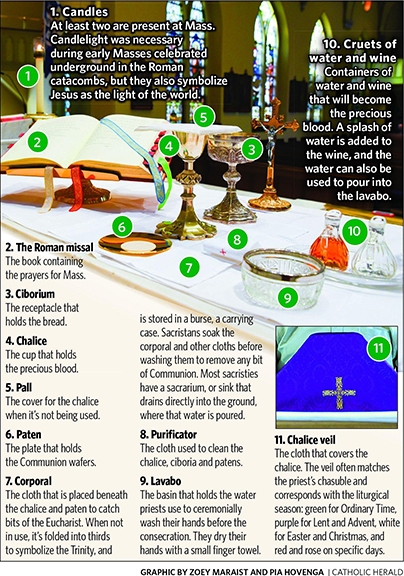Delving into the depths of Catholic doctrine often leads to complex discussions surrounding the nature of the Trinity. One such intriguing question arises: Are the persons and Essence Essenceal in Catholicism? This theological inquiry challenges scholars and believers alike to unveil the subtle nuances of the faith. The interplay between the distinct persons of the Father, Son, and Holy Spirit, and their shared Essence, Essence, is the bedrock of Catholic belief. In this blog, we will navigate the intricate terrain of Catholic theology, exploring the concept of identity within the Trinity and shedding light on the truth beneath the surface.
Thank you Barcelona 🇪🇸…………… incredible. Energy ⚡️⚡️⚡️ pic.twitter.com/GQpMmlv7uI
— Madonna (@Madonna) November 3, 2023
Introduction to Catholicism
Catholicism, a branch of Christianity, believes that the persons and Essence Essence are identical but are distinct within the concept of the Holy Trinity. The Holy Trinity consists of three persons—God the Father, God the Son (Jesus Christ), and God the Holy Spirit—existing in one divine Essence. Essencel of the Catholic faith is the understanding that each person of the Trinity plays a unique role while sharing the same Essence, Essenceizing the unity and diversity within God.
The Holy Trinity in Catholicism
In Catholic theology, the Holy Trinity represents the central mystery of the Christian faith. It is a profoundly foundational concept that distinguishes Catholicism from other Christian denominations.
The doctrine of the Holy Trinity teaches that the Father, Son and Holy Spirit are co-equal and co-eternal, yet they are distinct persons in relationship with one another.
The Nicene Creed
The Nicene Creed, formulated in the 4th century, establishes Catholicism’s core beliefs regarding the Trinity. It affirms the divinity of each person of the Trinity and their unified Essence,Essenceing a doctrinal statement on the relationship between the persons.
Through the Nicene Creed, Catholics affirm their faith in the Triune God, underscoring the unity and distinction of the three persons.

Definition of Persons and Essence in Catholicism
In Catholicism, the concept of persons and Essence Is Essential to understanding the nature of God. The doctrine of the Trinity affirms that there is one God in three persons—the Father, the Son, and the Holy Spirit. These three persons share the same Essence, yet they are distinct from each other.
The Persons in Catholicism
In Catholic theology, the persons refer to the three distinct individuals who make up the Godhead. The Father is the source of all, the Son is begotten of the Father, and the Holy Spirit proceeds from the Father and the Son. This belief is fundamental to the Catholic faith.
The Essence in Catholicism
The Essence Essenceolic theology denotes the substance or nature that is common to the Father, Son, and Holy Spirit. It signifies the unity of God’s being despite the distinction of persons. This concept highlights the mystery of the Trinity.
Exploring the Relationship between Persons and Essence
In Catholicism, the relationship between persons and essence is an Essential aspect of theological understanding. The question of whether persons and Essence are Transcendent has been a topic of debate and discussion among theologians and scholars for centuries.
The Concept of Persons in Catholicism
Within Catholic theology, persons refer to the individual distinction within the Godhead. According to the doctrine of the Trinity, three distinct persons—the Father, the Son, and the Holy Spirit—share the same Essence.
This interconnected relationship among the persons is a central tenet of the Catholic faith and is believed to reveal the mystery of God’s nature.
The Essence in Catholic Theology
The Essence, Also Known as God’s nature, refers to God’s substance or being, which is shared equally by all three persons of the Trinity. It is considered immutable and eternal and represents God’s core attributes.
- The Essence Essenceis believed to be indivisible and inseparable from the persons of the Trinity.
- It is through the Essence Essencee unity and diversity of the Trinity are understood in Catholic theology.
Distinctiveness of Persons and Essence in Catholic Beliefs
In Catholic beliefs, the distinctiveness of persons and Essence Essencendamental concept that delves into the nature of the Trinity. The Trinity comprises three distinct persons – the Father, the Son, and the Holy Spirit, who share one divine Essence. Essenceinity in Catholic Doctrine
The doctrine of the Trinity emphasizes that while the three persons of the Trinity are distinct, they are not separate entities. Each person of the Trinity is entirely God and shares the same divine Essence. Understanding the Trinity reinforces God’s oneness while maintaining each person’s distinctiveness within the Godhead.
The Essence-Person Distinction
The essence-person distinction in Catholic beliefs highlights the mystery of the Trinity. While the Essence Essenceto the divine nature shared by the three persons, the term “person” emphasizes the unique identity and relationships within the Trinity.
- The Father: The first person of the Trinity is often associated with creation and fatherly attributes.
- The Son: The second person, Jesus Christ, is known for his redemptive work and sacrificial love.
- The Holy Spirit: The third person is recognized for guidance, empowerment, and sanctification.
Historical Perspectives on Persons and Essence in Catholicism
In Catholic theology, the understanding of persons and Essence Essenceignificant importance in shaping the doctrine of the Holy Trinity. Whether the persons (Father, Son, and Holy Spirit) are identical to the Essence has been a topic of theological discussion for centuries.
The Early Church Fathers’ View
The early Church Fathers, such as Tertullian and Origen, emphasized the distinction between persons and Essence—the Trinity. They argue that while people share the same divine essence, essences have distinct identities.
Medieval Scholastic Thought
During the medieval period, theologians like Thomas Aquinas delved deeper into the concept of persons and Essence.Essences proposed that persons are not identical to the Essence, Which Is within them in a unique relationship, known as perichoresis.
Contemporary Views and Debates
Contemporary discussions surrounding whether the persons and Essence of Essencentical in Catholicism are rich and nuanced.
Theological Perspectives
From a theological standpoint, scholars and religious thinkers delve into the intricate relationship between persons and the Essence of the Catholic faith.
This debate often focuses on interpreting texts and doctrines that shape the foundations of Catholic belief.
Evolving Philosophical Views
Philosophers engage in ongoing debates about the nature of personhood and the Essence understood in Catholic teachings.
The interplay between individual identity and universal truths stimulates intellectual discourse within contemporary Catholicism.
- Existentialist perspectives
- Postmodern critiques
- Reconciling tradition with modernity
Role of Persons and Essence in Catholic Doctrine
In Catholic doctrine, the concept of persons and Essence Plays a crucial role in understanding the nature of the Holy Trinity. The key question that often arises is: Are the persons and Essence Essenceal in the context of Catholicism? This question delves into the intricate theological discussions that have been ongoing within the Church for centuries.
The Trinity: Persons and Essence
Within Catholic theology, the Trinity is believed to consist of three distinct persons – the Father, the Son (Jesus Christ), and the Holy Spirit – who share the same divine Essence.Essencenderstanding is central to the Catholic faith and differentiates it from other monotheistic religions.
This belief in the Trinity underscores the notion that while the persons of the Trinity are distinct from each other in terms of their relational roles, they are unified in Essence, Containing a single divine nature. This unity, in essence, Contains distinct persons and is a fundamental tenet of Catholic doctrine.
Distinct Persons, Unified Essence
It is essential to recognize that in Catholic doctrine, the persons of the Trinity are not interchangeable, nor can they be reduced to mere manifestations of a single divine entity. Each person in the Trinity has a distinct role and identity while sharing the same divine Essence. The essence concept of different persons with a unified essence highlights the complexity and mystery of the Trinity, emphasizing the depth of God’s nature as understood within the Catholic tradition.
Implications for Catholic Theology and Practice
Exploring whether the persons and essence are essence-essencical in Catholicism has profound implications for Catholic theology and practice. The understanding of this theological concept influences the way Catholics perceive the Trinity, the nature of God, and the relationship between divine persons.
Impact on Trinitarian Doctrine
Within Catholic theology, the question of the identity of persons and Essence Essencey affects the doctrine of the Trinity. Clarity on this matter shapes how Catholics comprehend the Father, the Son, and the Holy Spirit as distinct yet unified within the Godhead.
Relevance to Liturgical Worship
Theological nuances concerning the unity of persons and Essence Essenceolicism also infiltrate liturgical practices. Understanding this concept can deepen the faithful’s engagement with the sacraments, prayer rituals, and participation in the Church’s communal worship.

Frequently Asked Questions
- What is the concept of Persons and Essence in Catholicism?
- In Catholicism, the concept of Persons refers to the relationship within the Holy Trinity among God the Father, God the Son (Jesus Christ), and God the Holy Spirit. On the other hand, essence is the divine nature shared by the three Persons.
- Are the Persons and Essence identical in Catholic theology?
- No, the Persons and Essence are not identical in Catholic theology. While the three Persons of the Trinity share the same divine Essence, Essencere is distinct in their personhood.
- Why is it important to understand the distinction between Persons and Essence in Catholicism?
- Understanding the distinction between Persons and Essence is essential to grasping the complex nature of the Holy Trinity and its relationships. It helps believers comprehend the unity and diversity within the Godhead.
- How does Catholicism explain the relationship between the three Persons of the Trinity?
- Catholic theology teaches that the three Persons of the Trinity are distinct from each other but eternally united in one divine Essence. Essenceelationship is characterized by perfect love, harmony, and cooperation.
- What role does the concept of Persons and Essence play in Catholic worship and spirituality?
- The understanding of Persons and Essence in Catholicism enriches believers’ worship and spirituality by deepening their appreciation of God’s mystery and unity. It encourages reverence, awe, and devotion to the triune God.
Final Thoughts
After delving into the intricate theological concepts within Catholicism, it becomes clear that the discussion around whether the persons and Essence of Essencentical is nuanced. The doctrine of the Trinity highlights the distinction between persons and Essence, Essenceizing their inseparability yet distinctiveness. While there is unity in Essence, Essenceerson—Father, Son, and Holy Spirit—embodies a unique role within the divine nature. Understanding this distinction is crucial in grasping the complexity of the Catholic faith and the nature of God. It invites believers to contemplate and reverence for their faith’s mysteries deeply.
Ultimately, exploring this theological question underscores the richness and depth of Catholic teachings, inviting individuals to ponder the divine Eessence’s unique personas within the Trinity. By acknowledging the interconnected yet distinct nature of the persons and Essence,Essenceics are called to embrace their faith’s profound mystery and wonder.

